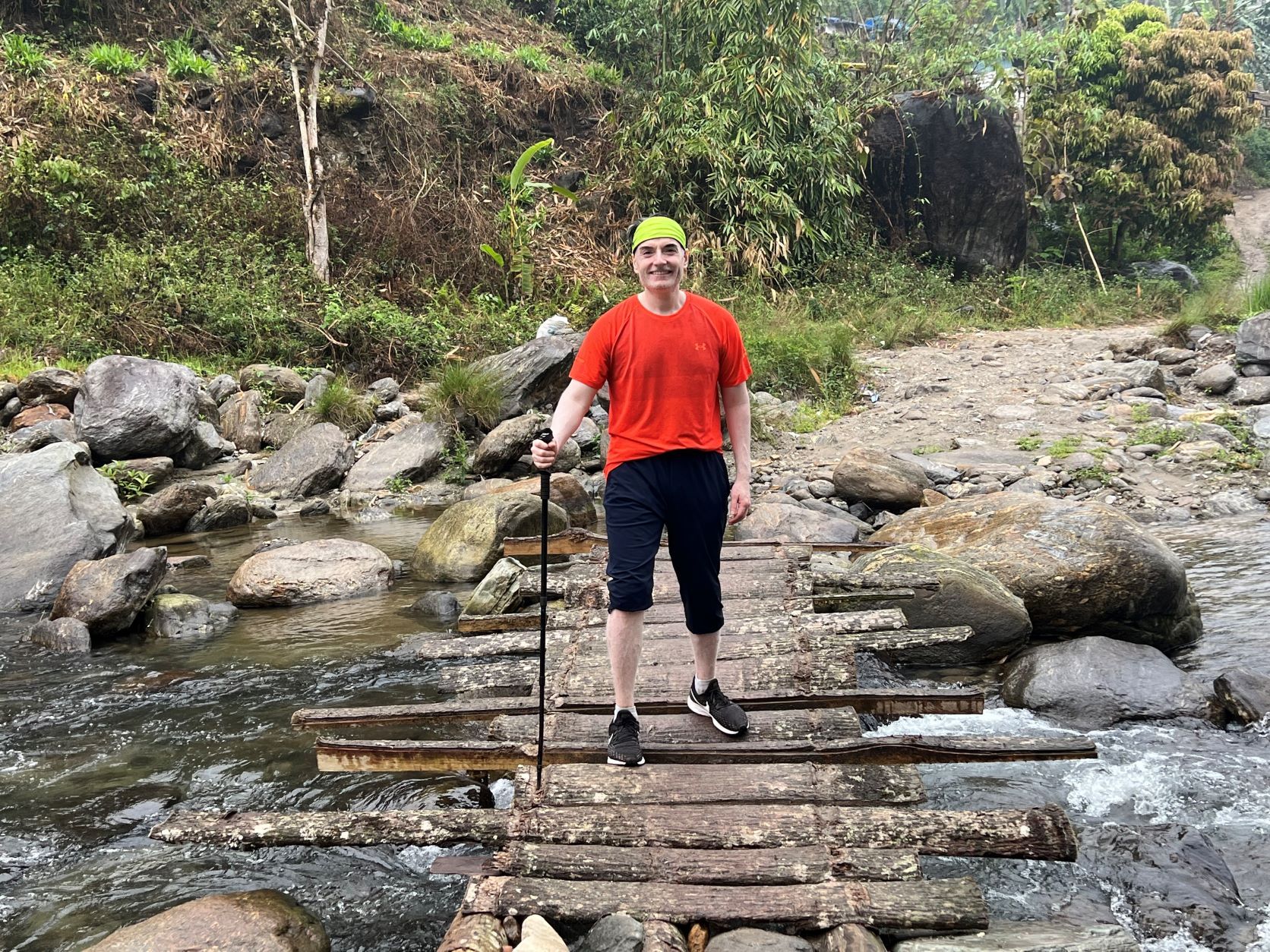We are somewhere near the border between West Bengal and Sikkim and I was about to action out a longstanding item on my bucket list - taking a hike! Brief Description: a round trip of ~6 hours with a total distance of ~25km across an altitude of ~1000 meters from the fantastic Glenburn Estate (highly recommended for travelers who like niche stays) to the Manjitar suspension bridge across numerous shortcuts through the forests and tea estates along the way.
I was super excited...my first real 'hike'!
The experience was awesome but also made me realize the parallels between the hiking journey so to speak and my own entrepreneurial journey. If you are an experienced hiker, the below anecdotes might sound too trivial or amateurish - cut me some slack for being a first-timer :)

1. You've got to want to do it: The morning of the hike saw a significant rain shower making the terrain slippery and a lot more difficult than otherwise. If I was at all in two minds, the weather was enough as a legitimate excuse to skip. However, I was very clear I was going for it so the unexpected change in the external conditions did not deter.
Taking an entrepreneurial plunge is similar, isn't it? There will be numerous reasons for not wanting to do it - if you are in a job, a sudden hike/promotion or another highly lucrative offer; if you are thinking of ideas, suddenly realizing someone else has already executed on your idea or pessimism from someone you shared your idea with...and I can go on...
Just like the hike, if you really want to start a venture, you'd shut off the potentially deterring externalities.

2. Resource constraints drive accelerated learning: I did not have the right shoes for a slippery terrain and this was obvious when I slipped and rolled a couple of times on the downhill in the first hour itself. We are in the middle of the forest already and there are no options to source or buy new hike-ready shoes. Going back to the starting point to get another pair would have set us back by a couple of hours and we would have risked hiking in the dark later on. So I decided to carry on and honestly surprised even myself by how quickly my body started adjusting - making use of the hike stick and also angling my feet sideways so as to better grip each step.
This is a classic startup problem, isn't it? The temptation sometimes is to go raise funds (if available) to either remove all resource constraints or pause your actions until you have solved for them - and maybe that's right. If there was a shoe store in the middle of the forest, I perhaps would have just bought a new pair. Or, if waiting for someone to come with another pair did not risk us hiking in the dark, I perhaps would have waited. However, in both cases, I would have missed out on the organic learnings that my constrained shoes enabled!
So relish the constraints as a huge learning opportunity, especially when removing them is either ill-timed or not possible.

3. One step at a time theory: There came a point where a landslide had literally created an almost 90 degree walk during one of our shortcuts through the forest. Now, to be honest: I was a bit scared. First timer at a real hike with slippery shoes and a wet terrain, and you tell me to cross about 15 feet vertically without any support. If I slip, I am probably dead, or handicapped at best.
Now if I thought of it all together, I probably would have abandoned the current path for an alternative route, losing a lot of time of course. So I almost instinctively decided to go for it. I said to myself: its not that far, not 15 feet for sure. I abandoned the hiking stick and used my hands to grip and moved one step at a time. It wasn't that bad at all. I made it! It was helpful that I was facing inward with my back facing the deep cliff :)
Such situations are quite the norm in a startup, aren't they? Fear of failure (falling off the cliff) or the end seeming too far to take the initial steps (15 feet) are the biggest reasons for why we might never take that first step.
And that's the big learning from the hike - you have to force yourself to stop thinking about your end-point or consequences of failure - just take the first step, then the second, and so on...keeping in mind that each step is a huge sign of progress!

4. You get stronger rather than the path becoming easier over time: The prevalent rain when we started turned to sunshine, the pauses I took before every challenging bit of terrain reduced, and I felt more and more confident even of my non-hiking shoes. Not to say that the terrain got any easier - if anything, it was tougher in the second half but I just felt more comfortable and more assured with the passing of every difficult bit of terrain. Now, the rain subsiding might be a coincidence, but the philosophical deduction is that because I took the bold step to venture in the rain, luck favored and made it easier later :) Plus, over ~25km, quite possible that it would rain only in certain parts of that long route!
As your startup grows, you get access to more resources and in general, gain more and more confidence as you overcome the mini challenges along the way. There is a theory that your 'timing' needs to be right or you need to be lucky but if you look at most successful ventures, they took the bold decisions and made their own luck as the classic saying goes.
Things in fact get harder as your grow bigger with increased competition, need to keep innovating, and also the need to manage pressures of various stakeholders. However, going through the tough patches makes you better prepared and more confident to keep conquering!

5. Gets easier if you have help and support: My guide Dinesh was a key reason I could navigate and successfully complete the hike - no doubt about that. His knowledge, experience, and just generally 'being there' - ah, almost impossible to imagine how I could have completed the hike without him. Yes, I needed a lot more of his guidance in the first half of the hike compared to the second half, but it was comforting to know that I was with someone who has done this before.
Dinesh could be anyone in the startup journey - your co-founder, mentor, investor, or even someone from your family. Sometimes we might think we can do it alone, especially if the startup has matured a bit and we have found our feet, but I think that's a mistake. The nature of your support system can change and evolve with time but you certainly need it.
So value your support system and nurture it for your continued ability to conquer challenges along the way!
As a wrap this up, I do want to highlight the best part about the hike apart from the above experiences - a prolonged 6 hour period when you are not constantly thinking about stuff, and I mean all kinds of stuff - your mind is too pre occupied in making sure you don't break any bones and keep marching ahead :)
Lastly, apologies again to the avid and pro hikers who might find my experiences naïve.
Great experience personally and I encourage all of you to 'go, take a hike'!

